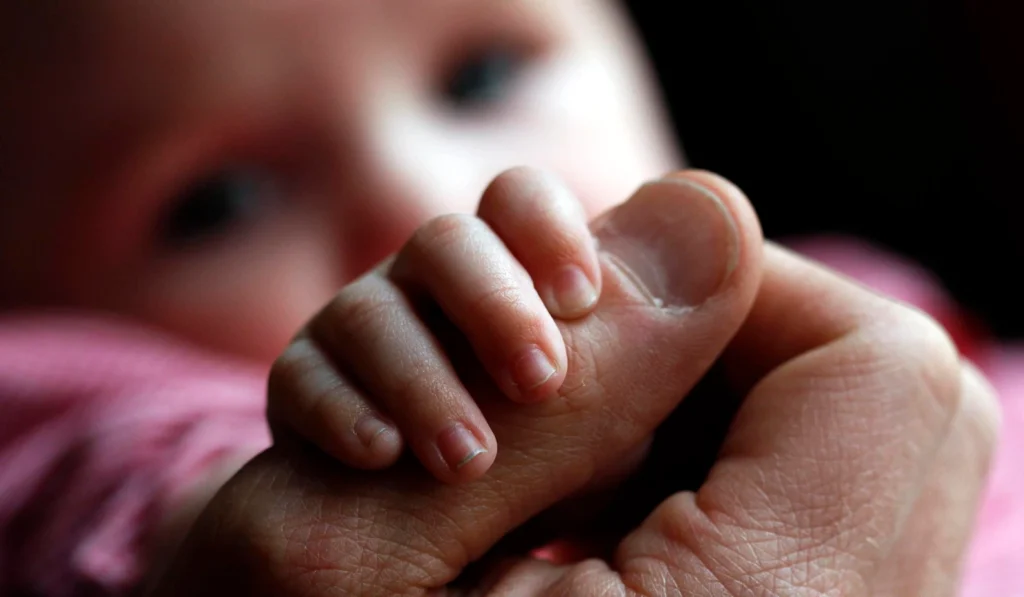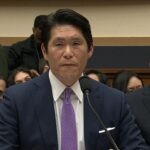
Published January 19, 2023
When you hear the phrase “women’s rights,” what comes to mind? In the U.S., at least, many of us likely think not of the right to vote or the right to seek an education — rights that women still lack in many parts of the world — but rather of the supposed right to have an abortion.
Abortion is considered so much a “women’s issue” that when a politician pledges to protect “women’s reproductive freedom,” we know he’s using a euphemism for one reproductive matter in particular. “Her body, her choice,” “No uterus, no opinion”: These slogans articulate the belief that abortion concerns women only and that the decision whether to let the child live rests with the mother alone.
This mindset intentionally overlooks the existence of the child’s father, at great cost to both mother and child and to our society. Mothers, to be sure, have a unique and irreplaceable responsibility to the child in the womb, sustaining him in the closest and most vulnerable of human relationships. No father has conceived or gestated a human being. No father has given birth or nursed a newborn. No father could attempt these things even if he wanted to.
When abortion-rights activists hold signs that read “Vasectomies prevent abortion,” they think they’re making a feminist argument for abortion when in fact they’re recognizing what pro-lifers insist is true: Every child has a mother and a father, and both are responsible for what happens to that child.
Indeed, the distinctions between the maternal and paternal relationships do not make a father any less a parent, any less important, or any less accountable for his child’s existence. The great evil of abortion is of course what it does to the unborn child. But though it is politically incorrect to admit, it is also an injustice to the father whose interest in his child’s life counts for nothing in the law. And the message of paternal irrelevance that the abortion license sends is especially insidious because it is well established by social science that children with fathers who are present — and, in particular, married biological parents — fare best down the road.
Yet, in the name of female empowerment, the pursuit of legal abortion historically has gone hand in hand with efforts to exclude fathers altogether from the decision-making process. The father is needed only insofar as he’s willing to drive to the clinic or send along a check. One of the great tragedies of legal abortion has been its sidelining of fathers, creating a vicious cycle in which many men feel justified in abandoning women or pressuring them to abort, and women feel even more reliant on abortion in order to survive.
Embedded in the landscape of the sexual revolution, abortion has facilitated a culture in which sex without commitment is expected and even encouraged. This arrangement appears to have benefited both men and women who crave sexual license with no expectations of relationship. But there is no such thing as sex without strings. Despite our technological innovations, this fact remains: Women get pregnant and men don’t. Neither birth control nor abortion manages to erase this reality, only appearing to do so while instead shifting the responsibility solely to the woman’s shoulders.
While commitment and marriage were once the social expectation, today there is the omnipresent backstop of the abortion clinic. As George Akerlof and Janet Yellen, a husband-and-wife team of economists, wrote in a 1996 article in the Quarterly Journal of Economics, widespread acceptance of abortion and contraception had led to a decline in “shotgun” marriages, which in turn had contributed to increases in child poverty as well as a trend they called the “feminization of poverty.” “By making the birth of the child the physical choice of the mother,” they wrote, “the sexual revolution has made marriage and child support a social choice of the father.” Accompanied by a general loosening of sexual mores and social guardrails, abortion has become the supposed means by which women can level the playing field and achieve equality with men, who, unlike women, can easily walk away from sex without facing serious consequences.
But far from leveling the playing field, societal acceptance of abortion as a women’s issue — paired with the exclusion of fathers from the abortion decision — has in fact offered men a get-out-of-jail-free card, the perfect excuse to vanish when they don’t wish to commit to a family or be responsible. It is, after all, the woman’s decision. Her body, her choice; her right, her problem. When a pro-choice Democratic lawmaker in Oklahoma recently proposed a bill requiring fathers to pay child support from the moment a child is conceived, he was forced to pull the legislation after malcontents on his own side of the aisle noted that the bill conceded too much to the pro-life perspective.
This coerced absence of fathers, demanded and received by ardent pro-choice feminists, is a significant reason why women have long sought abortions. In a survey published in the journal Family Planning Perspectives in 1988, about half of the sample of women who had had abortions said that relationship problems or the fear of being a single parent contributed to their decision. According to a Guttmacher Institute study, lack of support from the child’s father is one of several socio-economic concerns that women worldwide have cited as a reason for choosing abortion, second only to a general desire to postpone or stop childbearing.
In fact, despite claims to the contrary by abortion supporters, many women report that pressure or coercion from their child’s father is a chief reason for seeking an abortion. A 2017 study in the Journal of American Physicians and Surgeons reports that close to three-quarters of women surveyed said that their decision about abortion was subject to pressure from others, including family members or the child’s father. More than half of the women said they had chosen abortion in order to make others happy, while about a quarter said they did so out of fear of losing their partner. Another study, in the journal General Hospital Psychiatry, found that about a quarter of the women it surveyed said that “pressure” from a “male partner” contributed to their decision:
Women in this study gave examples of what they experienced as pressure from the male partner — one man said that if the woman did not have an abortion, she would ruin his future and his whole life. Another man threatened to break up the relationship and let the woman become a single mother. Thus, lack of important social support, sympathizing with the male partner, a broken heart and fear of standing alone may be components of the reason “pressure from the male partner” to have an induced abortion.
In the wake of last summer’s Supreme Court ruling that overturned Roe v. Wade, the pro-life movement has spent considerable energy on the question of how we might make abortion less accessible and less desirable. On the supply side of the equation, this takes the form of laws limiting the permissibility of abortion, punishing abortionists, and clamping down on mail-order chemical-abortion pills.
On the demand side, the discussion is even more complicated as pro-lifers debate policy measures that might encourage abortion-minded women to consider choosing life. Many of these community-level efforts predate Dobbs. A vast network of pregnancy-resource centers and maternity homes has existed for decades to help pregnant women who need material aid or a temporary place to live. Some pro-lifers advocate even broader support networks, such as state Medicaid expansions, programs such as Texas’s Alternatives to Abortion, a larger child tax credit, or a federal paid-family-leave plan.
Cultivating a society in which women receive support that makes it easier to eschew abortion is certainly a worthy goal. Pro-lifers rightly recognize that most women who choose abortion do so with great hesitation and consternation, and many of the pro-life efforts to dissuade and support these women have been highly successful.
But without restoring a culture of marriage, a culture in which sex takes place primarily in the context of love and commitment, a significant number of people will always believe that women need access to abortion in order to be equal to men and free. No welfare check or government program, no pregnancy-resource center or supportive community, can replace a husband and a father. The solution to the problem of men abandoning women and children isn’t to offer women abortion so that they can become more like deadbeat dads; the solution is to require that dads stay.
Nearly every time I speak to college audiences about abortion, I receive at least one question from a male student asking what young pro-life men should do about the fact that men are told they can’t have an opinion on the subject. I always offer the same two thoughts. First, I point out that we shouldn’t take this argument seriously even on its own terms. For one thing, abortion advocates never play by their own rules; when is the last time a feminist chastised a man who supports abortion?
Then I tell them: Being a man makes you no less credible an advocate for the unborn and for women, and, in some ways, men are even more important. Every child in the world came into being because of both a mother and a father. Many women who choose abortion do so because their partner has abandoned them or threatened to do so or has coerced them into it. The pro-choice worldview holds that, thanks to abortion, men don’t matter; they can have guilt-free sex and go on their merry way, leaving women to do as they please. This is a devastating lie. No one has more power to help a pregnant mother choose life than her child’s father.
Alexandra Desanctis is a fellow at the Ethics and Public Policy Center and a contributing writer at National Review.












